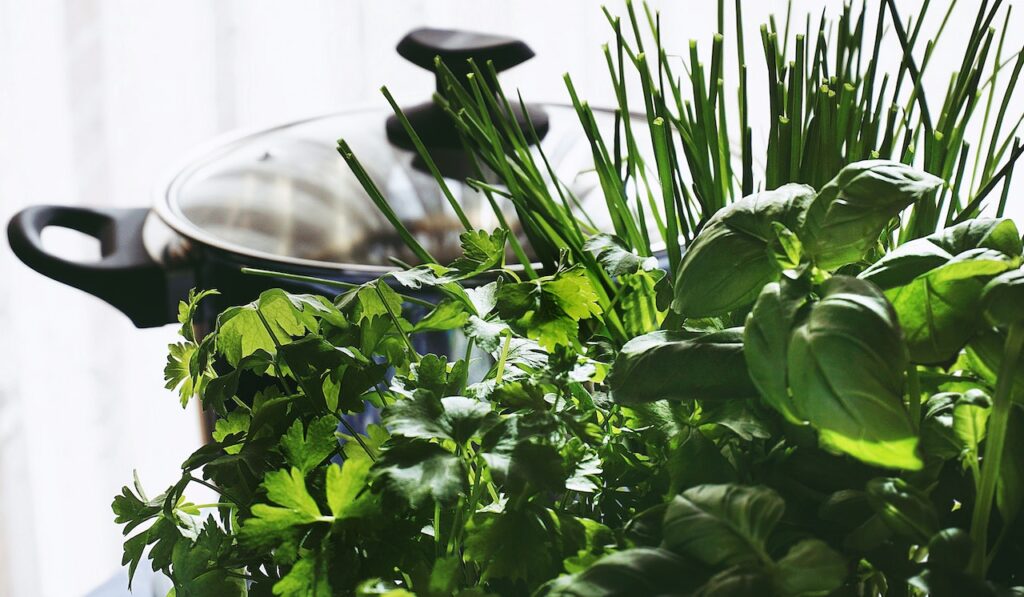We all know the value of growing and consuming our own, sustainable herb garden can improve our health. But the practice of gardening itself, literally being in touch with nature is so essential in improving our connection spiritually with all the beautiful creations Mother Nature provides for us.
Promoting creativity and a high sense of achievement brings happiness in our lives, which is projected by… butterfly effect. Spreading good vibes and joy to all who we are close to.
Last week I started my Healing Herb Garden journey. Built my zero-cost planter using recycled wood pallets and purchased my seeds and compost (I have started composting, and will share this adventure soon). Twenty litres of compost fits perfectly into the planter of dimensions 36inx8inx4in. Peppermint, Lemon Balm, Rosemary, Chives, Thyme, and Parsley have been sowed, and hoping we’ll have some tiny seedlings within a few weeks
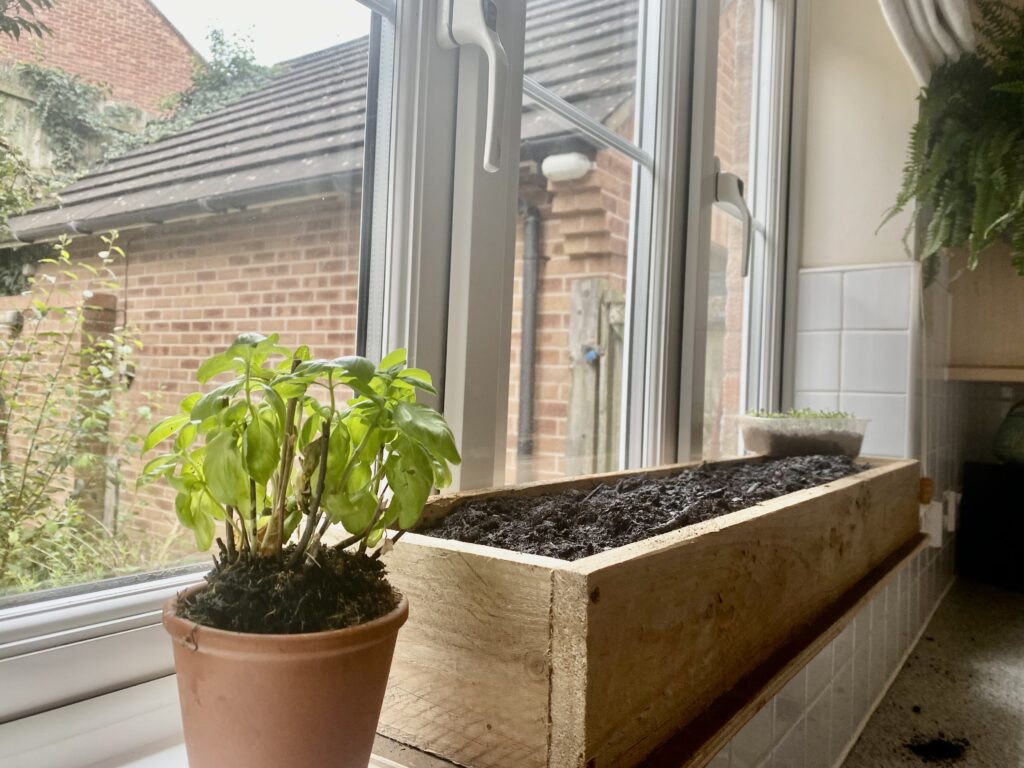
Last week we looked at Peppermint and Parsley. Giving you insight and basic knowledge to explore further if you want to use these herbs as an alternative therapy or alongside westernised medicine. This week I shall explore Lemon Balm and Rosemary.
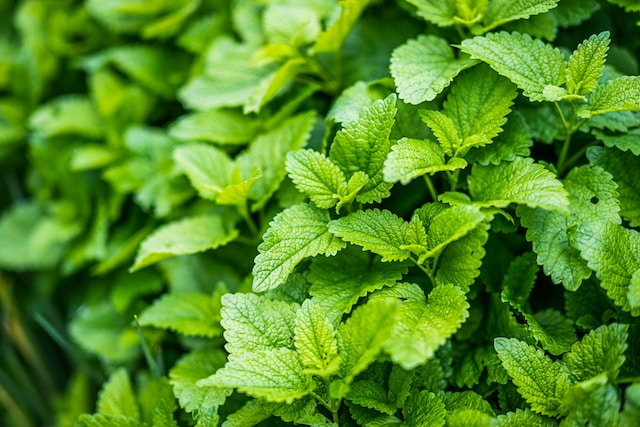
Lemon Balm (Melissa officinalis)
Lemon balm is a bushy, mildly lemon-scented herb from the mint family. It will grow, quite happily in either a sunny or slightly shaded position in your garden and as a cold hardy perennial is able to survive temperatures as low as -30 degrees Centigrade/-20 Fahrenheit. Allow for free drainage as Lemon Balm doesn’t do well in soggy soil.
When growing Lemon Balm indoors (in a herb planter) place it in a sunny position. This plant loves the sun when grown indoors and requires at least 5-6 hours of sunlight a day. Use light liquid fertiliser every few weeks to encourage growth.
The first documented use of Lemon Balm was in 300 BC when it was referred to as ‘Honey Leaf’ and used by Carmelite nuns in the 14th Century within their alcohol-based Carmelite water. Carmelite water is produced and used today as a herbal tonic.
Make your own Alcoholic Carmelite Water
Ingredients:
- 250g fresh lemon balm leaves
- 62g dried angelica root
- 1 tablespoon dried coriander seed
- 1 tablespoon fresh lemon zest
- 1 teaspoon cinnamon chips
- 2 whole cloves
- 1/8 teaspoon nutmeg
- 750 ml dry white wine
Method:
- Add all herbs and white wine into a lidded glass jar and thoroughly mix.
- Let the mixture steep for 4 to 6 hours.
- Once allowed to steep, use a coffee filter to strain the liquid and remove any herbs.
- Place the liquid into an airtight jar or bottle and refrigerate.
- Enjoy your chilled homemade Carmelite water (3-5 days) and all of its healing properties.
Health Benefits and Uses
Lemon Balm oil seems to have a sedative/calming effect on people who are suffering or predisposed to anxiety and/or depression. When used, Lemon Balm will help you to relax, reduce stress and anxiety, and promote sleep.
As well as its calming qualities it is also an amazing adjunct to your skincare regime. It is used to revive and tighten the skin making it look firmer and more toned, and its brightening effect on darker patches brings out your skin’s natural radiance and beauty. As Lemon Balm contains caffeic and rosmarinic acid it can be used as a natural sunscreen too.
It is also worth using Lemon Balm as soon as you feel the tingle of a cold sore (Herpes simplex virus) as studies show when applied topically it significantly reduces redness and swelling.
t
It is also a useful bug-repellant. Place in garden planters near your BBQ or outdoor eating area to reduce those pesky insects landing on food or in your drinks.
A very versatile herb. Lemon Balm has many health benefits, is an alcoholic beverage, and has many culinary uses. One for the windowsill herb planter.
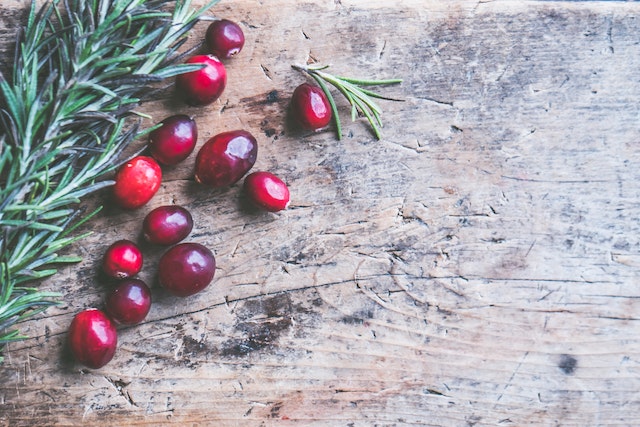
Rosemary
Rosemary is a staple herb used in many kitchens to add aromatic flavour to a variety of dishes, including meat, especially lamb, fish, pasta, tomato dishes, and lemon sauces. This wonderful herb is also a favorite of bees and other life-saving pollinators. A reason to almost certainly have one planted outdoors too.
Rosemary is an ever-green scrub, which is extremely hardy (survive -15 degrees centigrade / 5 Fahrenheit) and will survive our UK winters in sunny, well-drained soil and a sheltered position. If in an ideal location, Rosemary will provide for you all year round.
If growing from seed (as I am) it could take from 14-28 days before you see any sprouts of green through the compost. Keep moist, and in a sunny position. It is suggested to place the planter in clear plastic to aid germination (warm and humid environment). I shall try this, hopefully speeding up the germination process.
Health Benefits
Rosemary’s healing powers were known by both the Romans and Greeks as far back as 3500 BC and were believed to be mystical powers and ward off evil spirits, hence abundant in their gardens.
It was known back then that it had medicinal qualities, they believed it could improve circulation, help with memory loss, and have healing properties. With the information we have now, they were spot on.
As with Lemon Balm, Rosemary contains rosmarinic acid and also carnosic which have anti-fungal, anti-bacterial, and anti-viral properties. With this in mind, regular consumption of rosemary could naturally decrease your risk of infection, especially if immunocompromised.
Rosemary is known to have mild analgesic effects and studies have shown it can be as potent as paracetamol (acetaminophen) in relieving pain.
Rosemary oil can also be used to relieve acute anxiety eg. immediately before exams. Studies have shown, that when rosemary oil is sniffed for 5 minutes immediately before a high anxiety activity it reduces the stress hormone cortisol by 23%.
Preliminary studies show that Rosemary has anti-inflammatory properties (due to antioxidants present) and can reduce pain caused by rheumatoid arthritis by 50% following knee massage using Rosemary oil.
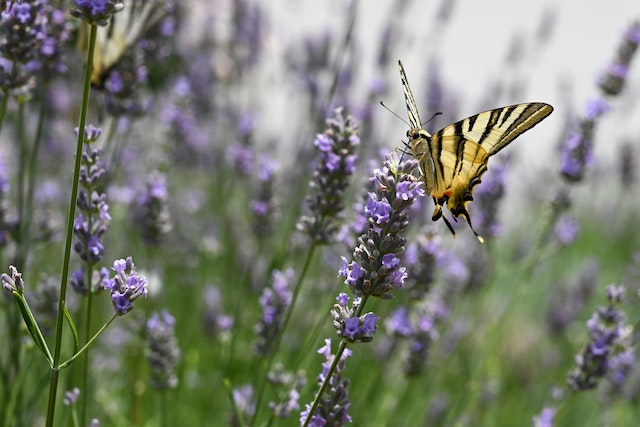
These are but a few of the Health Benefits of both Lemon Balm and Rosemary. The list goes on. It’s not until you delve deeper than just the culinary uses that you realise how beneficial these herbs are.
Take the plunge and start using them as Mother Nature intended, to promote healing and improve our health and well-being. Nature gives us everything we need. Exploring our world and the natural healers surrounding us boosts our mental health and educating ourselves can lead to sustainable practices.
If taking any prescription drugs or pregnant/breastfeeding please consult your medical practitioner before consuming any plant or herb or when using it as a holistic therapy in conjunction with our westernised traditional medicine.
As with any therapy, if you have any side effects stop using it immediately and consult your medical practitioner.

